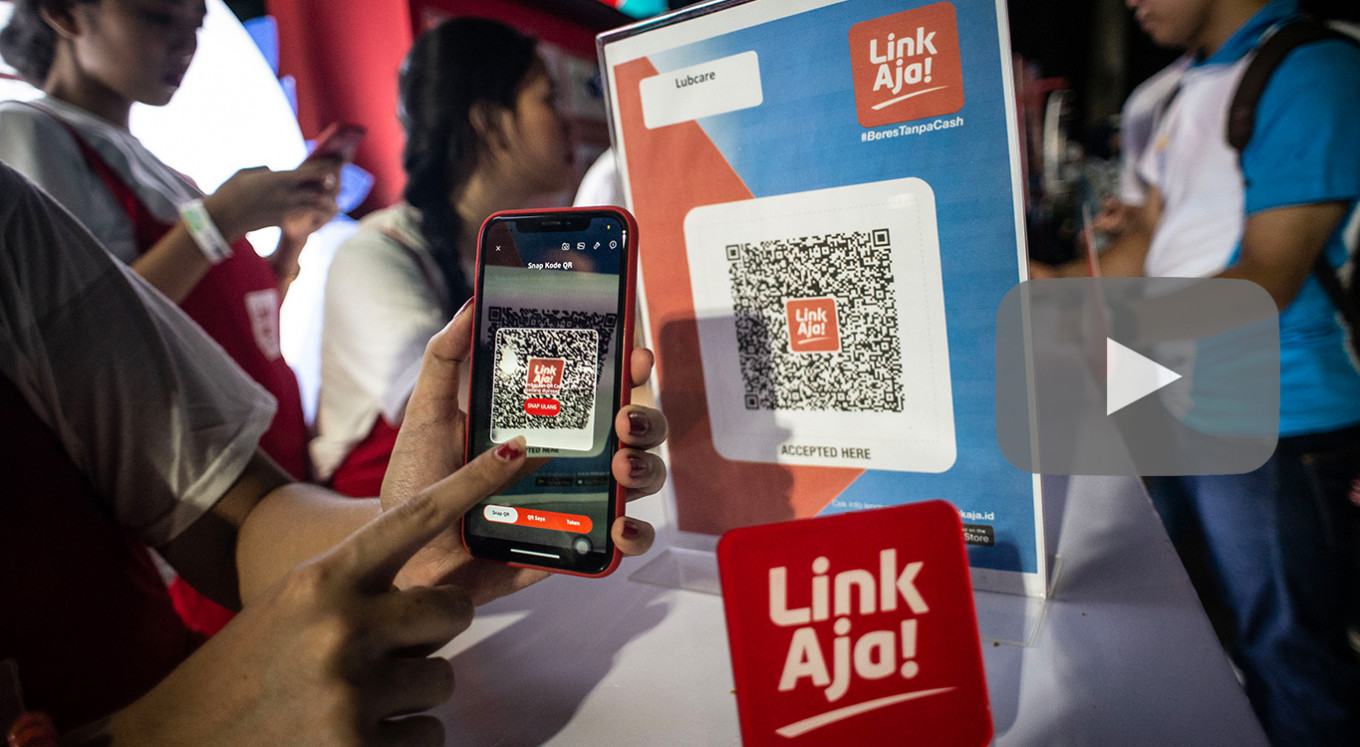Popular Reads
Top Results
Can't find what you're looking for?
View all search resultsPopular Reads
Top Results
Can't find what you're looking for?
View all search resultsLinkAja credits SOE collaboration, COVID-19 for extreme growth
The digital payment system has recorded exponential growth in transaction volume since the Indonesian outbreak emerged in March.
Change text size
Gift Premium Articles
to Anyone
A
year and a half since it started doing business, state-backed digital payment platform LinkAja has reported strong growth propelled by robust collaboration with state-owned enterprises (SOEs).
LinkAja chief marketing officer Edward Kilian Suwignyo said the platform had assisted 466 traditional markets in 22 Indonesian cities transition to a digital system, as well as connected over 234,000 merchants to its noncash payment platform.
“Cooperation between sectors is very important to reach all [levels] of society in Indonesia,” Edward said at a virtual press conference on Wednesday. To stimulate the accelerated adoption of digital technology, LinkAja was not charging small and medium enterprises (SMEs) to join the platform, he added.
LinkAja is a product of PT Fintek Karya Nusantara (Finarya), a subsidiary of state-owned telecommunications giant PT Telekomunikasi Selular (Telkomsel) that was founded on Jan. 21, 2019. LinkAja is now co-owned by seven other SOEs: Bank Rakyat Indonesia (BRI), Bank Negara Indonesia (BNI), Bank Mandiri, Bank Tabungan Negara (BTN), Pertamina, PT Asuransi Jiwasraya and PT Danareksa.
According to the 2020 financial report of parent company PT Telekomunikasi Indonesia, Finarya was not yet profitable and booked a net loss of Rp 821 billion at the end of last year.
The platform's ties to SOEs have proven a vantage point as the firms help propel LinkAja to the forefront of e-payment players in Indonesia's fintech sector, particularly as the COVID-19 health crisis has pushed customers, businesses and markets across the country to switch to cashless transactions.
BRI consumer director Handayani said at Wednesday's press conference that top-up transactions among LinkAja users had grown twofold since the outbreak emerged in Indonesia. In terms of transaction volume, the platform had recorded 700 percent growth.
“Now everyone is using e-wallets because physical money is deemed dangerous as a [vector of] virus transmission,” she said.
Digital banking senior vice president Sunarto Xie of Bank Mandiri said the bank had recorded 2 million top-up transactions totaling around Rp 600 billion in May. He added that Mandiri's collaboration with LinkAja was helping it reach a new customer segment.
“We used to say, ‘This is the unbankable segment’. Why? Because the cost of serving them was greater than the revenue we [made]. Digital [payment] platforms have now transformed that by making the cost to serve very low,” Sunarto said.
“Transactions through MyPertamina and LinkAja consistently rose along with the completion of digital infrastructure at all gas stations,” Pertamina retail marketing director Mas’ud Khamid said during the same event.
He added that Pertamina was pursuing a digitization program for over 7,000 petrol stations and 160,000 liquefied petroleum gas (LPG) outlets to offer the LinkAja payment facility, planned for completion by the end of this month
PT Kereta Commuter Indonesia (KCI), meanwhile, had introduced its own noncash payment facility in 2013 and added LinkAja just last year.
“By ecosystem, up to 70 percent of our service users use the e-money [payment facility]. [Some] of these users use the LinkAja service,” noted KCI commercial vice president Karina Amanda .
She added that in normal times, the Commuter Line transported over 1 million passengers per day. The train service was currently averaging 400,000 passengers per day.
The switch to digital payment systems among the Indonesian public was projected to become a long-lasting trend, said LinkAja's Edward. Entering June, he had seen “quite a significant increase” in e-commerce transactions and utility payments on the platform.
CEO Andi Kristianto of Telkomsel Mitra Inovasi, Telkomsel's venture arm, said that it had been strengthening its technology infrastructure to better cater to fintech payment services like LinkAja.
University of Indonesia economics professor Mohamad Ikhsan, who is also an expert staffer at the SOEs Ministry, pointed out that digitalization would not only help during a crisis, but it would also drive productivity and economic growth.
He noted, however, that the implementation of a digitalization policy would depend on whether access and infrastructure, as well as the bureaucracy, were in ready to support a cashless system.
“It is possible that digitalization will create greater inequality,” Ikhsan also cautioned, as people with a higher level of education would be quicker to adapt to a digital ecosystem.










